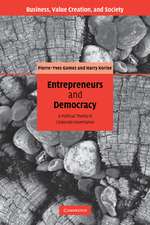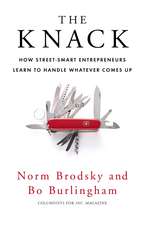The Princessa: Machiavelli for Women
Autor Harriet Rubin, Devon Rubinen Limba Engleză Paperback – 28 feb 1998
For centuries men have used the lessons of Machiavelli's The Prince to gain and hold power. Today's women, struggling to succeed in a man's world, must learn a crucial lesson of their own: men and women are not equal--and that is a woman's greatest strength. From the wars of intimacy to battles of public life, whether confronting bosses, competitors, or lovers, the greatest power belongs to the woman who dares to use the subtle weapons that are hers alone.
This provocative work urges women to claim what they want and deserve, offering a bold new battle plan that celebrates a woman's unique gifts: passion and intuition, sensitivity and cunning. It draws from history's legendary female divas and poets, saints and sinners, artists and activists--who, armed with a desire for justice and a spirit of outrageousness, achieved their impossible dreams. Their lasting legacy is codified in The Princessa: act like a woman, fight like a woman, and life will be yours to command.
Preț: 100.16 lei
Nou
Puncte Express: 150
Preț estimativ în valută:
19.17€ • 20.83$ • 16.11£
19.17€ • 20.83$ • 16.11£
Carte disponibilă
Livrare economică 31 martie-14 aprilie
Preluare comenzi: 021 569.72.76
Specificații
ISBN-13: 9780440508328
ISBN-10: 0440508320
Pagini: 208
Dimensiuni: 130 x 192 x 11 mm
Greutate: 0.2 kg
Editura: dell
ISBN-10: 0440508320
Pagini: 208
Dimensiuni: 130 x 192 x 11 mm
Greutate: 0.2 kg
Editura: dell
Notă biografică
Harriet Rubin has worked in publishing for twenty years. In 1989 she founded Currency, where she has published the works of leading executives, economists, management gurus, and CEOs. She has written for The New York Times, The Wall Street Journal, Publishers Weekly, and women's magazines. She lives in New York City.
Extras
A prince is a man among men, a canny fighter, a steely sovereign who takes what he wants out of life. The term has been one of honor, but the feminine corollary--princess--has been a term of derision, until now.
Katherine Anne Porter said it best: "What a man did only for God, a woman did always for a man." But now a princessa may do for herself. I offer you this parable: Two sisters embarked on a journey. After a long day, they finally arrived at their hotel room. The room was adequate but not comfortable. The younger sister was satisfied, but the older insisted they move immediately. "Each night in my life is as important as any other night," she explained to her weary sister.
A princessa, like Machiavelli's prince, is a woman among women, a canny fighter, a steely sovereign. Take what you want out of life, and remember: Each night is as important as every other night; each day is yours for the taking.
Letter from the Machiavella I Have Become to the Reader, the Princessa of a Troubled, Embattled Domain
I have written this book for you, princessa. Like Machiavelli's prince, you may be sitting alone somewhere safe, wanting to take control of your life, your loves, your problems--the way the young Florentine prince was desperate to take control of a kingdom run amok. At that moment, Machiavelli appeared on the Medici palace scene to tell the prince stories and lessons of how the great Caesars and Spaniards and Popes triumphed over similar woes by fighting.
This book is about war, not the bloody kind, not the kind provoked by Caesar's hatreds or Sun Tzu's deceits or Napoleon's egomania. It's about the wars of intimacy, where the enemy is close enough to hurt you, betray you, oppose you, whether it be a spouse, boss, client, parent, child. It is about war as the route to power. By war, I mean conflict. By conflict, I mean a particular kind of relationship with others, with yourself, and with the world. Conflict is contact. It requires power; it builds power.
In every encounter, one person always has more command over the situation than the other--and may contest you for the things you want. If you lose, you lose your struggle to have a better, fairer, nobler, and sweeter life. Most of us have had no way to express the fight that we keep locked up inside--all those unreached desires--except through tears of frustration or grief, anger, depression, silence, and submission--all of which can mean instant and irrecoverable losses.
I have found a way for a woman to become the artist of her anger and her desire.
The need for these skills dawned on me one night when I was sitting in the Palace Bar in San Francisco. It was 2 a.m. The piano player had long since fled. But my friends Nora and Judith and I weren't going anywhere, even though Nora was on deadline and Judith was trying not to think about where her lover would end up that night--with her or with someone else. I'd promised to call D. when I got back to my hotel, but the sound of his voice was a cold shower I didn't want to feel, the voice of a man who had walked out on me the times I needed him most. What was wrong with us, three women who trotted success around on a leash like a prizewinning dog? Why were we scared of facing our own lives? Why were we warriors nothing, really, but wimps?
Here we were, three formidable women, all capable of negotiating multimillion-dollar deals, but not our own raises. Control freaks though we are, we consistently get involved in relationships where we relinquish control and end up playing the game our lovers' way. Strong though we are, we ask for so little, and then are surprised when we get it. Days when I walk to work in Times Square, I see sign after sign promoting LIVE GIRLS ON STAGE! I may hate what the signs represent but can still appreciate the irony: live girls deserve to be stars; on the street, I pass droves of deadened women, their eyes blank, their expressions passive, their egos reduced by their own negative expectations.
Until now, women have had no language for the fight. We have not been able to express our desire for power. I knew that I wanted power, but I didn't know how to acquire it. When I became a book editor, I found myself working with CEOs to help them craft the books that assured them of an intellectual legacy. I taught myself how to be their publisher, the businesswoman they trusted to do well by their deals and their words. When I became their intellectual confidante, I came closer and closer to the center of what made them tick.
One highly reclusive CEO invited me into his inner chamber and asked me to analyze its passageways and corners as if I were analyzing his mind. From their boardrooms to their emotions, I got to study a variety of business leaders and management gurus, trend setters and strategists up close. I became the repository of their confessions, their ambitions, their fears, and so much else. They told me how they made their fortunes. They showed me how to take command of underlings and lieges. Everything I learned from them taught me how to rise in the corporation. How to thrive in a relationship. How to take what I wanted from the world.
Unless we learn to take for ourselves, we are doomed to be princessas-in-hiding forever, not governing a palace but trapped in the Palace Bar, protected by our failure.
You are going to read here about women who have won the rule of their domain. You will learn about strategies to win the wars of intimacy. I will not let you turn away from this quest. The cost of that would be your life, your happiness. "If I'd known how to fight," a friend's mother once said, "I would have lived a better life."
"Learn not to be careful," the photographer Diane Arbus insisted with her students. Careful is safe, peaceful, and on the sidelines of the action.
That night I decided to step into Machiavelli's shoes, to apply all that I had learned finally to my own benefit.
I will teach you war.
Katherine Anne Porter said it best: "What a man did only for God, a woman did always for a man." But now a princessa may do for herself. I offer you this parable: Two sisters embarked on a journey. After a long day, they finally arrived at their hotel room. The room was adequate but not comfortable. The younger sister was satisfied, but the older insisted they move immediately. "Each night in my life is as important as any other night," she explained to her weary sister.
A princessa, like Machiavelli's prince, is a woman among women, a canny fighter, a steely sovereign. Take what you want out of life, and remember: Each night is as important as every other night; each day is yours for the taking.
Letter from the Machiavella I Have Become to the Reader, the Princessa of a Troubled, Embattled Domain
I have written this book for you, princessa. Like Machiavelli's prince, you may be sitting alone somewhere safe, wanting to take control of your life, your loves, your problems--the way the young Florentine prince was desperate to take control of a kingdom run amok. At that moment, Machiavelli appeared on the Medici palace scene to tell the prince stories and lessons of how the great Caesars and Spaniards and Popes triumphed over similar woes by fighting.
This book is about war, not the bloody kind, not the kind provoked by Caesar's hatreds or Sun Tzu's deceits or Napoleon's egomania. It's about the wars of intimacy, where the enemy is close enough to hurt you, betray you, oppose you, whether it be a spouse, boss, client, parent, child. It is about war as the route to power. By war, I mean conflict. By conflict, I mean a particular kind of relationship with others, with yourself, and with the world. Conflict is contact. It requires power; it builds power.
In every encounter, one person always has more command over the situation than the other--and may contest you for the things you want. If you lose, you lose your struggle to have a better, fairer, nobler, and sweeter life. Most of us have had no way to express the fight that we keep locked up inside--all those unreached desires--except through tears of frustration or grief, anger, depression, silence, and submission--all of which can mean instant and irrecoverable losses.
I have found a way for a woman to become the artist of her anger and her desire.
The need for these skills dawned on me one night when I was sitting in the Palace Bar in San Francisco. It was 2 a.m. The piano player had long since fled. But my friends Nora and Judith and I weren't going anywhere, even though Nora was on deadline and Judith was trying not to think about where her lover would end up that night--with her or with someone else. I'd promised to call D. when I got back to my hotel, but the sound of his voice was a cold shower I didn't want to feel, the voice of a man who had walked out on me the times I needed him most. What was wrong with us, three women who trotted success around on a leash like a prizewinning dog? Why were we scared of facing our own lives? Why were we warriors nothing, really, but wimps?
Here we were, three formidable women, all capable of negotiating multimillion-dollar deals, but not our own raises. Control freaks though we are, we consistently get involved in relationships where we relinquish control and end up playing the game our lovers' way. Strong though we are, we ask for so little, and then are surprised when we get it. Days when I walk to work in Times Square, I see sign after sign promoting LIVE GIRLS ON STAGE! I may hate what the signs represent but can still appreciate the irony: live girls deserve to be stars; on the street, I pass droves of deadened women, their eyes blank, their expressions passive, their egos reduced by their own negative expectations.
Until now, women have had no language for the fight. We have not been able to express our desire for power. I knew that I wanted power, but I didn't know how to acquire it. When I became a book editor, I found myself working with CEOs to help them craft the books that assured them of an intellectual legacy. I taught myself how to be their publisher, the businesswoman they trusted to do well by their deals and their words. When I became their intellectual confidante, I came closer and closer to the center of what made them tick.
One highly reclusive CEO invited me into his inner chamber and asked me to analyze its passageways and corners as if I were analyzing his mind. From their boardrooms to their emotions, I got to study a variety of business leaders and management gurus, trend setters and strategists up close. I became the repository of their confessions, their ambitions, their fears, and so much else. They told me how they made their fortunes. They showed me how to take command of underlings and lieges. Everything I learned from them taught me how to rise in the corporation. How to thrive in a relationship. How to take what I wanted from the world.
Unless we learn to take for ourselves, we are doomed to be princessas-in-hiding forever, not governing a palace but trapped in the Palace Bar, protected by our failure.
You are going to read here about women who have won the rule of their domain. You will learn about strategies to win the wars of intimacy. I will not let you turn away from this quest. The cost of that would be your life, your happiness. "If I'd known how to fight," a friend's mother once said, "I would have lived a better life."
"Learn not to be careful," the photographer Diane Arbus insisted with her students. Careful is safe, peaceful, and on the sidelines of the action.
That night I decided to step into Machiavelli's shoes, to apply all that I had learned finally to my own benefit.
I will teach you war.
Recenzii
"Rubin's insights are brilliant in their simplicity and effectiveness...a book sure to be underlined, dog-eared, and re-read for inspiration and aid."
--USA Today
"A beautiful book, full of wisdom."
--Atlanta Business Chronicle
--USA Today
"A beautiful book, full of wisdom."
--Atlanta Business Chronicle
Descriere
Showing women how to use their intrinsic skills--sensitivity, emotional depth, and selflessness--to achieve success, Rubin provides the prescription for changing the rules, empowering women to use and be recognized for these inherent strengths.












